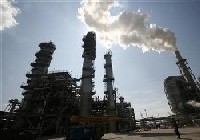 | « Back to article | Print this article |
 Poor performance of manufacturing and mining sectors pulled down the industrial growth rate to 3.6 per cent in February, but experts do not see any softening of monetary policy by the Reserve Bank as inflation is still above the comfort level.
Poor performance of manufacturing and mining sectors pulled down the industrial growth rate to 3.6 per cent in February, but experts do not see any softening of monetary policy by the Reserve Bank as inflation is still above the comfort level.
The factory output, measured in terms of the index of industrial production, dipped to 3.6 per cent in February from 15.1 per cent a year ago.
This was because of slippages in performance of capital goods and basic goods sector, though consumer goods sector continued to post good results.
The deceleration in IIP, according to Planning Commission Deputy Chairman Montek Singh Ahluwalia, will not impact the gross domestic product growth rate, estimated at 8.6 per cent during 2010-11, as the shortfall will be made up by robust farm sector growth.
"Annual inflation remains...well in excess of the central banks medium term target of 4-5 per cent.
Further interest rate increases later this year remain likely.
Despite subdued industrial production results, hawkish rhetoric from senior RBI representatives in the past month suggests the next interest rate increase could come as early as 3 May," Moody's Analytics senior economist Matt Robinson said.
He, however, said that the country's growth prospects remain solid though the continuous rate hikes since the past one year will ensure industrial production remains subdued in the first half of 2011.
The Reserve bank has already hiked policy rates eight times since March 2010 to tame inflationary pressure.
The overall inflation in February was 8.31 per cent.
It has remained above the 8 per cent mark since February 2010 and renewed concerns have been expressed over rising crude prices on account of the conflict in Libya.
Global crude prices passed the USD 112 per barrel rate during the weekend as the unrest in Libya, an OPEC member, continued. RBI's next quarterly meeting is to take place on May 3.
Meanwhile, the IIP for January 2011, has been revised upwards to 3.95 per cent, from 3.7 per cent. During April-February period of current fiscal, industrial growth slowed to 7.8 per cent, from 10 per cent in the same period of the previous financial year.
Asked whether the below 8 per cent industrial growth would be sufficient to clock 8.5 per cent GDP growth this fiscal, Planning Commission Deputy Chairman Montek Singh Ahluwalia replied, "Yes, it will because I think agriculture growth will be higher than the earlier forecast (of 5.4 per cent)."
Crisil chief economist D K Joshi said that industrial production would remain subdued for another month or two.
"The slower growth is due to a combination of factors -- higher base and slowing of investments. However, we expect industrial growth to average around 7.7 per cent for the whole fiscal," he said.
Joshi said industrial growth may pick up by April or May but added that he do not foresee any halt by the Reserve Bank in its monetary tightening policy.
"Inflation is still at an uncomfortable level. So RBI will continue its current policy and we can expect another round of rate hikes in May," he said.
Yes Bank chief economist Shubhada Rao said: "For sustained growth, we need to see stronger traction in investment cycle.
"Higher input costs as well as tightening interest rates are expected to moderate the industrial growth going forward.
"However, we expect IIP figures to pick up in the second half of the current fiscal," she said. Rao added that low IIP numbers are the result of a high base.
"We expect an average IIP between 7 and 7.5 per cent in the current fiscal," she said, adding that RBI is likely to hike the repo and reverse repo rates by 25 basis points each in its next two reviews.
Factory output was low in February as capital goods contracted by 18.4 per cent.
The sector had expanded by a robust growth of 46.7 per cent in February, 2010. In February, manufacturing growth plummeted to 3.5 per cent from 16.1 per cent during the same period a year ago.
However, production in the consumer non-durables segment went up by 6.1 per cent during the month under review.
It had contracted by 0.8 per cent in the same period of 2010. Consumer durables segment grew by 23.4 per cent in February as against 29.1 per cent in the same month of last year.
Overall consumer goods reported a rise of 11.1 per cent as against 6.3 per cent in February last year.
Intermediate goods reported a rise of 8.4 per cent during the month as against a growth of 15.9 per cent in February 2010.
Mining growth also plummeted to 0.6 per cent in the month under review from 11 per cent in the comparable month of 2010.
Electricity generation output rose by 6.7 per cent in February, compared to 7.3 per cent growth in the same month last year.
Commenting on the numbers, Deloitte director Anis Chakravarty said: "Given the high interest rates currently prevailing, this trend of sluggish growth may persist for the next couple of months.
"The good news is that infrastructure demand is reviving and so have exports. We expect this to have a positive effect by the second quarter."